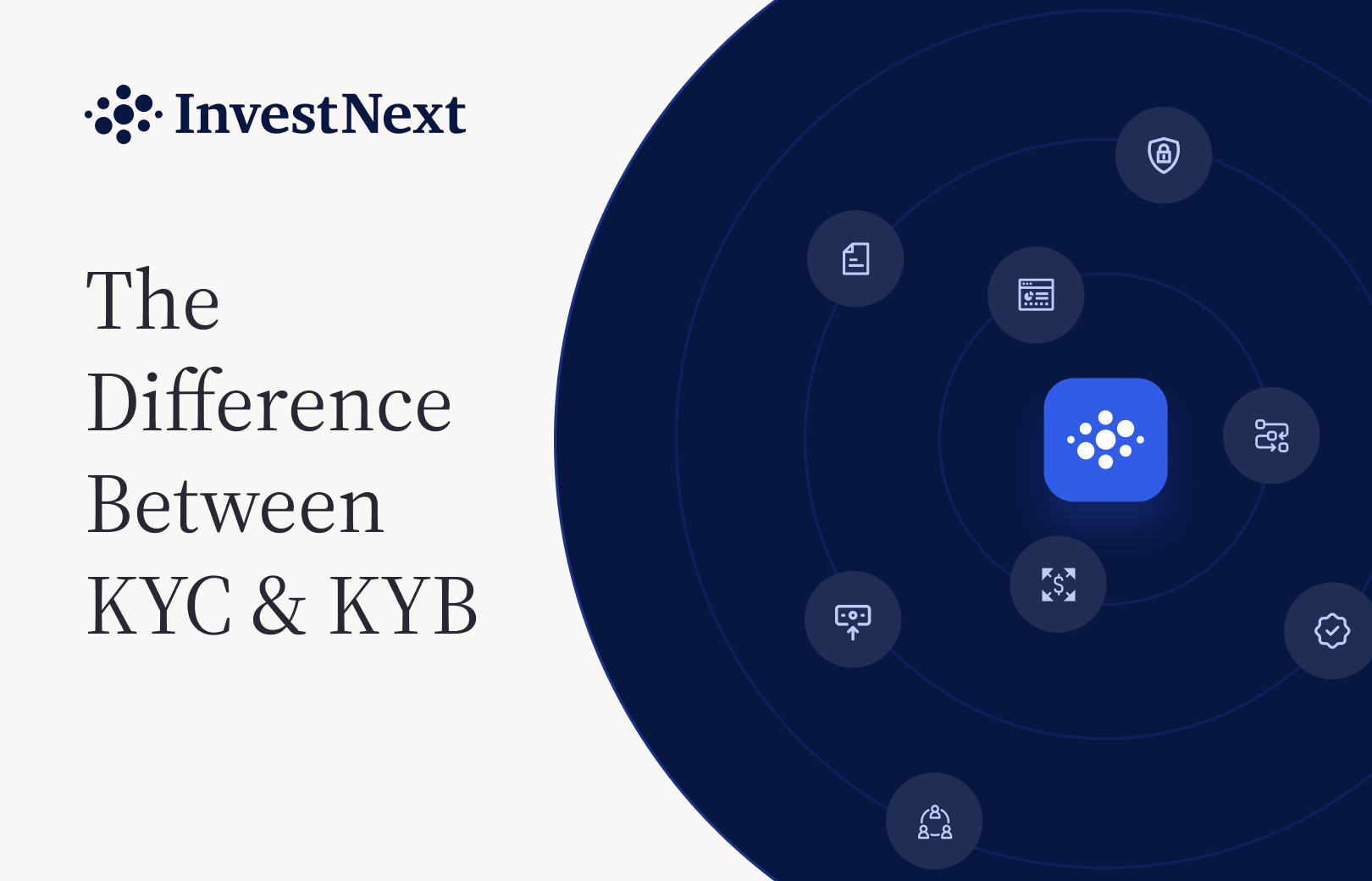Ensuring compliance in the financial sector, particularly in investment and real estate markets, is crucial for enhancing your firm’s credibility, building trust with investors, and reducing the risk of financial penalties. FinCEN and the SEC are issuing NPRMs and new compliance regulations across financial markets – understanding KYC & KYB processes is a must for firms that are preparing for an environment where compliance is a requirement. This article explores the distinctions between real estate KYC (Know Your Customer) and real estate KYB (Know Your Business), their procedures, and their significance in maintaining regulatory compliance for real estate investment management firms.
What is KYC (Know Your Customer)?
Definition and Purpose of KYC
Know Your Customer (KYC) is a method used by financial institutions and real estate investment management firms to confirm the identity of their clients. This practice helps prevent fraud, money laundering, and other financial crimes by ensuring businesses understand who their clients are and the risks they might pose.
In the era of increased compliance scrutiny by FinCEN and the SEC, sponsors that do not implement KYC are at risk of financial penalties, fines, criminal charges, and litigation.
FinCEN and the SEC have continued to add regulations to a variety of players in the investment management space, from adding requirements to beneficial owner reporting to reclassifying investment advisors as financial institutions. FinCEN is working to “significantly improve efforts to protect the U.S. financial system” and “bring the U.S. in line with international counterparts.”1
The message from the SEC and FinCEN is clear: investment managers and advisers must prepare for a market where compliance is not recommended, but required.
The KYC Process
The standard KYC process involves:
- Customer Identification: Collecting basic information such as name, date of birth, and address.
- Verification: Confirming this information through documents like passports, driver’s licenses, or utility bills.
- Due Diligence: Conducting further checks to understand the customer’s risk profile, including their financial behavior and transaction history.
- Ongoing Monitoring: Continuously reviewing and updating customer information and transaction patterns to detect and prevent suspicious activities.
Anti-Money Laundering (AML) regulations mandate KYC protocols to prevent illegal activities within the financial system.
What is KYB (Know Your Business)?
Definition and Purpose of KYB
Know Your Business (KYB) focuses on verifying the legitimacy of businesses instead of individual clients. KYB ensures that businesses are not involved in fraudulent activities and that they operate legally and ethically.
The KYB Process
The typical KYB process includes:
- Verification of Business Entities: Confirming the legal status and registration of a business.
- Beneficial Owners: Identifying individuals with significant control or ownership of the business.
- Business Activities: Assessing the nature of the business activities to ensure they comply with legal standards.
Compliance with KYB regulations helps prevent business-related fraud and ensures transparency in corporate operations when raising capital from institutional investors.
KYC vs. KYB: Key Differences
While both KYC and KYB are crucial for regulatory compliance and enhancing credibility with investors, they serve different purposes:
- Focus: KYC is aimed at individual clients, while KYB is focused on businesses.
- Process: KYC involves personal identification and verification, whereas KYB includes the verification of business legitimacy and beneficial ownership.
- Application: KYC is used in retail banking, personal finance, and by real estate firms when raising capital from accredited investors and individuals. KYB is essential for corporate banking, financial institutions, and real estate firms raising capital from institutional investors.

Why Are KYC and KYB Important?
KYC and KYB offer significant benefits:
- Building Trust: Ensuring that clients and businesses are legitimate, fosters trust between real estate firms and their clients. Efficient compliance produces that are user friendly for investors, and easy to manage for sponsors creates enhanced trust and credibility.
- Ensuring Compliance: Adhering to KYC and KYB regulations helps businesses avoid financial and legal penalties while maintaining and elevating their reputation.
- Protecting Against Financial Crimes: Effective KYC and KYB processes help detect and prevent fraud, money laundering, and other financial crimes.
The Importance of KYC and KYB for Real Estate Investors
As sponsors think about how to effectively raise capital today, seamlessly onboarding investors is a critical component to building strong investor relationships and converting interest into commitments.
Anytime you’re bringing more investors into your network, maintaining compliance and protecting yourself and your other investors should be top of mind.
“Regulatory requirements in the real estate investment sector have historically been a moving target, but there’s a trend of increased scrutiny across the real estate sector as a whole. At InvestNext, we aim to be more than a technology provider for our clients. We are their operational partner, and we believe strongly that KYC and KYB will one day be the new standard for onboarding real estate investors. As a partner, we aim to stay ahead of that and build the solutions for our clients to help them meet those standards now, not later.” – Kaylee Poston (Product Marketing Manager)
Examples of Consequences of Non-Compliance
Non-compliance with regulatory requirements can have severe consequences. In addition to direct penalties, such as fines and legal actions, compliance issues can necessitate the removal of an investor during the late stages of a capital raise. “This can impact the timeline of your raise, affecting deal profitability and resource allocation. Moreover, perhaps the biggest long-term impact is on the trust and confidence of your other investors. A breach of trust is difficult to repair, and the risk isn’t worth it.”
“It only takes one commitment from a person or entity on a watch list, for example, to jeopardize a fund or a single asset deal.” – Matthew Attou (Chief Product Officer)
Practical Tips for Businesses to Implement Effective KYC and KYB Processes
Manually implementing a KYC process can be costly, resource-intensive, and cause unnecessary friction for your investors.
“Traditional KYC processes can really slow things down for the investor, create more work for the sponsor and slow down the deal.” – Matthew Attou (Chief Product Officer)
Using a technology partner that can integrate KYC and KYB into your existing business onboarding and commitment flows is the most cost-effective way to implement AML prevention for your investments. InvestNext offers comprehensive KYC software solutions to streamline compliance procedures, ensuring that your processes are efficient and compliant.
“InvestNext will perform a liveness check across all beneficial owners. We’ll cross-reference the Office of Foreign Assets Control, conducting AML screenings to create a safe investing experience for everyone.” – Matthew Attou (Chief Product Officer)
Common Challenges in KYC and KYB
Businesses often face several challenges in implementing KYC and KYB processes:
- Complex Regulations: Navigating varying regulations across different regions can be complex.
- Resource Intensive: Verification processes can be time-consuming and resource-heavy.
- Data Management: Ensuring the accuracy and security of customer and business data is critical but challenging.
- Ongoing Monitoring: Continuously reviewing and updating investor information and transaction patterns to detect and prevent suspicious activities is time-consuming and error-prone.
The InvestNext platform provides robust solutions to overcome these challenges, offering automated compliance tools that simplify KYC and KYB processes.
Trends in Technologies in the Field of Regulatory Compliance
Regulatory requirements in the real estate investment sector have historically been a moving target, but there’s a trend of increased scrutiny across the real estate sector as a whole.
“As of January 1st, 2024, the Financial Crimes Enforcement Network (FinCEN) now requires entities that own and operate U.S. real estate to report their beneficial owners. These are the natural persons that ultimately own or control such entities to FinCEN. Authorities are paying closer attention to real estate transactions involving entities or funds originating from jurisdictions known for weak AML controls or high levels of corruption. Financial institutions and real estate professionals are increasingly expected to conduct enhanced due diligence on clients involved in real estate transactions, particularly high-value properties or entities with complex ownership structures.”- Kaylee Poston (Product Marketing Manager)
Staying ahead of these trends will help businesses maintain compliance and enhance their overall security posture. At InvestNext, we believe strongly that KYC and KYB will become the new standard for onboarding real estate investors, and we are seeing more and more firms start to incorporate it as a standard component of their onboarding process.
Benefits of Leveraging Technology for KYC and KYB
“Leveraging technology and education is key. I’m sure every investor out there has seen a scam or two and can really appreciate the extra steps that the sponsor is taking to protect their investment.” – Matthew Attou (Chief Product Officer)
In the era of increased scrutiny on financial transactions and regulatory requirements, Investment managers should proactively build compliance processes to prepare for an environment where compliance is non-negotiable. Leveraging technology for compliance protects sponsors and their investors, enhances their credibility and builds trust, and creates a strong foundation for safe and scalable growth.
For more detailed information on KYC and KYB compliance features offered by InvestNext schedule a demo.










